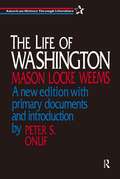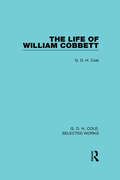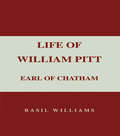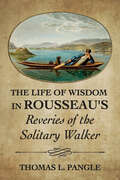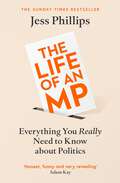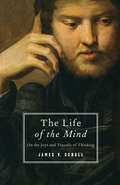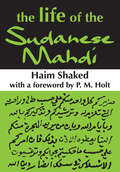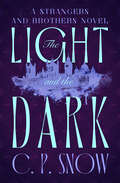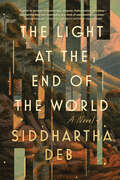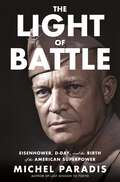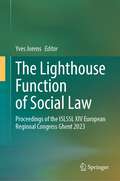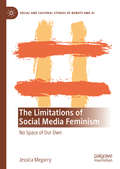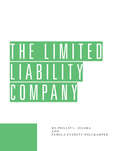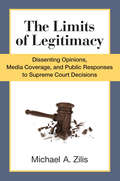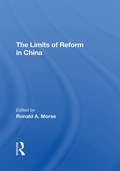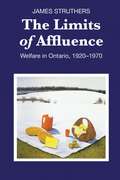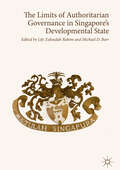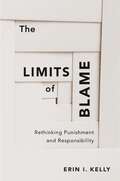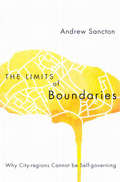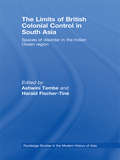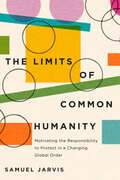- Table View
- List View
The Life of Washington: With Curious Anecdotes, Equally Honourable To Himself, And Exemplary To His Young Countrymen ... Embellished With Six Engravings
by Mason L. WeemsWeems helped to fabricate the image of Washington that has since dominated the American historical imagination and which in its time, secured Washington's fame. This edition includes documents that provide an insight into the construction of American national identity.
The Life of William Cobbett (Routledge Library Editions)
by G D ColeThis volume is representative of the historical works of a particular period (1923-29) when there was a hiatus in the output of Cole the theoretician. It is an extraordinary contribution to labour history and is among the finest of his historical works.
The Life of William Pitt, Volume 1: Earl of Chatham
by Basil WilliamsThis impressive study of the life of William Pitt, Earl of Chatham, was first published in 1913 when it achieved instant recognition as a brilliant appraisal of Pitt's career. It is a book with many outstanding merits to commend it to students of eighteenth century English history. Based on thorough and extensive researches, it traces Pitt's career from his election as a Member of Parliament for Old Sarum in 1735 and gives a well balanced account of his part in home and foriegn politics and colonial affairs during the next 30 years. The book contains many good maps and an excellent index, and a very valuable appendix gives a list of all Pitt's extant speeches, with references to where reports of them may be found. These two substantial volumes are invaluable as a portrait of one of the most outstanding historical figures of the eighteenth century.
The Life of William Pitt, Volume 1: Earl of Chatham
by Basil WilliamsThis impressive study of the life of William Pitt, Earl of Chatham, was first published in 1913 when it achieved instant recognition as a brilliant appraisal of Pitt's career. It is a book with many outstanding merits to commend it to students of eighteenth century English history. Based on thorough and extensive researches, it traces Pitt's career from his election as a Member of Parliament for Old Sarum in 1735 and gives a well balanced account of his part in home and foriegn politics and colonial affairs during the next 30 years. The book contains many good maps and an excellent index, and a very valuable appendix gives a list of all Pitt's extant speeches, with references to where reports of them may be found. These two substantial volumes are invaluable as a portrait of one of the most outstanding historical figures of the eighteenth century.
The Life of Wisdom in Rousseau's "Reveries of the Solitary Walker"
by Thomas L. PangleThe Life of Wisdom in Rousseau's "Reveries of the Solitary Walker" is the first complete exegesis and interpretation of Rousseau's final and culminating work, showing its full philosophic and moral teaching. The Reveries has been celebrated as a work of literature that is an acknowledged acme of French prose writing. Thomas L. Pangle argues that this aesthetic appreciation necessitates an in-depth interpretation of the writing's complex and multileveled intended teaching about the normatively best way of life—and how essential this is for a work that was initially bewildering.Rousseau stands out among modern political philosophers in that he restored, to political philosophy, what Socrates and his students (from Plato and Xenophon through Aristotle and the Stoics and Cicero) had made central—and that the previous modern, Enlightenment philosophers had eclipsed: the study of the life and soul of the exemplary, independent sage, as possessor of "human wisdom." Rousseau made this again the supreme theme and source of norms for political philosophy and for humanity's moral as well as civic existence.In his analysis of The Reveries, Pangle uncovers Rousseau's most profound exploration and articulation of his own life, personality, soul, and thought as "the man of nature enlightened by reason." He describes, in Rousseau's final work, the fullest embodiment of the experiential wisdom from which flows and to which points Rousseau's political and moral philosophy, his theology, and his musical and literary art.
The Life of a Kashmiri Woman: Dialectic of Resistance and Accommodation
by Nyla Ali KhanCapturing the history of Kashmir and its cultural and social evolution, Nyla Ali Kahn deconstructs the life of her grandmother and other women of her generation to reconceptualize woman's identity in a politically militarized zone. An academic memoir, this book succinctly brings together the history, politics, and culture of Kashmir.
The Life of an MP: Everything You Really Need to Know About Politics
by Jess Phillips&‘This book is here to take you inside the daily realities of Westminster. I don&’t mean that it&’s going to bore you to death with a blow by blow account of what it&’s like to sit on the Statutory Instrument Debate on Naval regulations 1968-2020 – but to demystify the places and practice of politics.&’ From agonising decisions on foreign air strikes to making headlines about orgasms, from sitting in on history-making moments at the UN to eating McCain potato smiles at a black-tie banquet in China, the life of a politician is never dull. And it&’s also never been more important. But politics is far bigger than Westminster, and in this book Jess Phillips makes the compelling case for why now, more than ever, we all need to be a part of it. With trademark humour and honesty, Jess Phillips lifts the lid on what a career in politics is really like and why it matters – to all of us. This is the inside story of what&’s really going on.
The Life of the Mind
by James V. SchallIn The Life of the Mind, Georgetown University's James V. Schall takes up the task of reminding us that, as human beings, we naturally take a special delight and pleasure in simply knowing. Because we have not only bodies but also minds, we are built to know what is. In this volume, Schall, author of On the Unseriousness of Human Affairs (ISI Books), among many other volumes of philosophical and political reflection, discusses the various ways of approaching the delight of thinking and the way that this delight begins in seeing and hearing and even in making and walking. We must be attentive to and cultivate the needs of the mind, argues Schall, for it is through our intellect that all that is not ourselves is finally returned to us, allowing us to live in the light of truth.
The Life of the Sudanese Mahdi
by Haim ShakedThe Mahdia was an important Islamic millenarian movement of the Nilotic Sudan in the last two decades of the nineteenth century. It contributed substantially to the emergence of the Sudan as a nation-state in the twentieth century. The Mahdi's family and heritage played a major political and cultural role in the Sudan, both before and after independence.This volume begins with introductory material on the Mahdia and a biographical sketch of the author of the Sra, followed by discussion of composition, acquisition, sources, and literary features of the account. The text itself presents a condensed paraphrase of the account while retaining the spirit of the original document. It pays special attention to preserving historical events. Appendixes include full transcriptions of the main source materials for the biography, two photographic reproductions of the handwriting of the original Arabic manuscripts, and an annotated list of the Mahdist proclamations and letters transcribed in the original Arabic text of the Sra.
The Light and the Dark (The Strangers and Brothers Novels)
by C.P. SnowA gifted young academic in 1930s England falls prey to a dangerous mindset in this novel by &“a master craftsman&” (The New York Times). Roy Calvert is young, well-liked, and financially secure. He is also a brilliant scholar at Cambridge, engaged in translating ancient documents related to the Manichaean heresy. Yet despite these advantages and successes, he is prone to an unpredictable, inexplicable melancholy that neither love nor work can seem to overcome. It will pull Roy into the orbit of a rising historical darkness—and leave his friend, Lewis Eliot, to witness the frightening struggle between Calvert and his demons . . .Praise for the Strangers and Brothers Novels &“Mr. Snow has established himself . . . in an eminent and conspicuous position among contemporary English novelists.&” —New Statesman
The Light at the End of the World
by Siddhartha DebConnecting India&’s tumultuous 19th and 20th centuries to its distant past and its potentially apocalyptic future, this sweeping tale of rebellion, courage, and brutality reinvents fiction for our time.Delhi, the near future: Bibi, a low-ranking employee of a global consulting firm, is tasked with finding a man long thought to be dead but who now appears to be the source of a vast collection of documents. The trove purports to reveal the secrets of the Indian government, including detention centers, mutated creatures, engineered viruses, experimental weapons, and alien wrecks discovered in remote mountain areas.Bhopal, 1984: an assassin tracks his prey through an Indian city that will shortly be the site of the worst industrial disaster in the history of the world.Calcutta, 1947: a veterinary student&’s life and work connect him to an ancient Vedic aircraft that might stave off genocide.And in 1859, a British soldier rides with his detachment to the Himalayas in search of the last surviving leader of an anti-colonial rebellion.These timelines interweave to form a kaleidoscopic, epic novel in which each protagonist must come to terms with the buried truths of their times as well as with the parallel universe that connects them all, through automatons, spirits, spacecraft, and aliens. The Light at the End of the World, Siddhartha Deb&’s first novel in fifteen years, is a magisterial work of shifting forms, expanding the possibilities of fiction while bringing to life the India of our times.
The Light of Battle: Eisenhower, D-Day, and the Birth of the American Superpower
by Michel ParadisA thrilling new biography of Dwight Eisenhower set in the months leading up to D-Day, when he grew from a well-liked general into one of the singular figures of American history."This is hands-down the most deeply researched, sensitive, intimate, and nuanced portrait of Eisenhower." —DAVID KENNEDY, recipient of the Pulitzer Prize for History | "A masterly portrait." —General WESLEY CLARK | "Gorgeously written. The only must-read book to mark the 80th anniversary of D-Day." —ALEX KERSHAW, New York Times bestselling author | STARRED reviews from Publishers Weekly, Kirkus, and Library JournalOn June 6, 1944, General Dwight Eisenhower addressed the thousands of American troops preparing to invade Normandy, exhorting them to embrace the “Great Crusade” they faced. Then, in a fleeting moment alone, he drafted a resignation letter in case the invasion failed.In The Light of Battle, Michel Paradis, acclaimed author of Last Mission to Tokyo, paints a vivid portrait of Dwight Eisenhower as he learns to navigate the crosscurrents of diplomacy, politics, strategy, family, and fame with the fate of the free world hanging in the balance. In a world of giants—Churchill, Roosevelt, De Gaulle, Marshall, MacArthur—it was a barefoot boy from Abilene, Kansas, who would master the art of power and become a modern-day George Washington.Drawing upon meticulous research and a voluminous body of newly discovered records, letters, diaries, and firsthand accounts from three continents, Paradis brings Eisenhower to life, as a complicated man who craved simplicity, a genial cipher whose smile was a lethal political weapon.With a page-turning pace and an eye for the overlooked, Paradis interweaves the grand arc of history with more human concerns, bringing readers into the private moments that led to Eisenhower’s most pivotal decisions. By deftly integrating the personal and the political, he reveals how Eisenhower’s rise both reflected and was integral to America’s rise as a global superpower.An unflinching look at how character is forged, and leadership is learned, The Light of Battle breathes new life into the man who made “the leader of the free world” the mantle of the American presidency.
The Lighthouse Function of Social Law: Proceedings of the ISLSSL XIV European Regional Congress Ghent 2023
by Yves JorensThis is the conference book for the XIV European Regional Congress of the International Society for Labour and Social Security Law, dedicated to the interactions between social law and other areas of law. In recent years, labour law and social security law have been subject to various reforms and developments. Social law is however not an isolated domain but rather interacts with other fields, often even functioning as a guide or giving direction to those lost at sea. In other words: serving as a lighthouse. The key aspect addressed in this book is the existence of a connection between social law sensu stricto (labour law and social security law) and other areas of law. Pursuing an inter- and multidisciplinary approach, it gathers contributions on topical and challenging issues in four broad areas: 1. Basic and fundamental principles of European social law 2. The future in the light of the past 3. The impact of regionalisation 4. Enforcement in social law In turn, various developments can be identified in connection with these topics: the emergence of social criminal law is creating new overlaps between social and criminal law; the growing number of administrative law sanctions offers new insights into and connections between social security law and administrative law; the increasing similarity of employment in the public and private sectors raises questions about the applicability of administrative law in labour law relations; the relation between the ECHR and the articles of the Constitution opens up new perspectives on the constitutional interpretation of freedoms and on the interaction between human rights, constitutional law and social law; and lastly, there is a growing influence of EU law and international treaty law (concerning trade) on social law. Can we, by looking at these developments, draw certain conclusions at a different and innovative level? The contributions were selected by an international working group of distinguished scholars from across Europe.
The Lilliputians of Environmental Regulation: The Perspective of State Regulators (Routledge Research in Environmental Policy and Politics)
by Michelle C. Pautz Sara RinfretWhen we think about environmental policy and regulation in the U.S., our attention invariably falls on the federal level and, more specifically, the U.S. Environmental Protection Agency. Although such a focus is understandable, it neglects the actors most responsible for the implementation and maintenance of the nation's environmental laws - the states. Recognition of the importance of the states still ignores an even smaller subsection of actors, inspectors. These front-line actors in state environmental agencies are the individuals responsible for writing environmental rules and ensuring compliance with those rules. They play an important role in the environmental regulatory state. With data collected from more than 1,200 inspectors across 17 states, Michelle C. Pautz and Sara R. Rinfret take a closer look at these neglected actors to better understand how environmental regulators perceive the regulated community and how they characterize their interactions with them. In doing so, they explore the role these front-line actors play, what it is like to be them, what they think of their place in the environmental regulatory system, and how they interact with the regulated community. An original, timely and unmatched volume advancing the debate on the future of environmental regulation in the U.S.
The Limitations of Social Media Feminism: No Space of Our Own (Social and Cultural Studies of Robots and AI)
by Jessica Megarry#MeToo. Digital networking. Facebook groups. Social media continues to be positioned by social movement scholars as an exciting new tool that has propelled feminism into a dynamic fourth wave of the movement. But how does male power play out on social media, and what is the political significance of women using male-controlled and algorithmically curated platforms for feminism? To answer these questions, Megarry foregrounds an analysis of the practices and ethics of the historical Women’s Liberation Movement (WLM), including the revolutionary characteristics of face-to-face organising and the development of an autonomous print culture. Centering discussions of time, space and surveillance, she utilises radical and lesbian feminist theory to expose the contradictions between the political project of women’s liberation and the dominant celebratory narratives of Web 2.0. This is the first book to seriously consider how social media perpetuates the enduring logic of patriarchy and howdigital activism shapes women’s oppression in the 21st century. Drawing on interviews with intergenerational feminist activists from the UK, the USA, Australia, Canada and New Zealand, as well as archival and digital activist materials, Megarry boldly concludes that feminists should abandon social media and return to the transformative powers of older forms of women-centred political praxis. This book will be of interest to scholars and students of Women’s and Gender Studies, Lesbian and Queer Studies, Social Movement Studies, Critical Internet Studies and Political Communication, as well as anyone with an interest in feminist activism and the history of the WLM.
The Limited Liability Company
by Pamela Nollkamper Phillip JelsmaLLC Forms and Answers For guidance on efficiently forming and expertly advising LLCs, turn to James L. Leet, James Clarke, and Pamela Nollkamper's The Limited Liability Company. You will find the book and free Digital Access filled with practical advice, hundreds of reproducible forms, tax consideration, state-by-state analysis, and more: Forms * Pre-formation checklists; mandatory state articles of organization, with alternative provisions; state default rules; sample operating agreements, with opt-in features checklist and drafting outline; buy-sell agreements * Procedures and issues * Mandated articles of organization; filing procedures; all statutory requirements; and more... Now you can efficiently form LLCs custom-tailored to a variety of purposes, and provide quick answers to a wide range of client LLC questions with The Limited Liability Company. The Limited Liability Company provides complete materials for every state - all statutory requirements and forms: * Content permitted in articles of organization and operating agreements * Name reservation, filing and other formation procedures and fees Drafting checklists and digitized forms allow you to quickly create customized formation documents. Numerous alternative article provisions are also provided: management, committees, transfers, members, voting, notice, operating, arbitration, merger, share exchange, consolidation, and more. Also provided are model operating agreements and buy-sell agreements, both with alternate provisions and drafting outlines. Detailed Tax Guidance A comprehensive tax chapter addresses the most troublesome taxation issues you will encounter with LLCs. * Artful drafting can avoid many governance challenges, since many common LLC problems are both foreseeable and preventable. The Limited Liability Company provides drafting advice and alternate clauses to help avoid abuse by majority owners, operational deadlock, divorce of member, discharge of minority owners, unfair distribution of profits, withdrawal of members, mergers and acquisitions, and more. Key Issues and Procedures To help you traverse other difficult areas, The Limited Liability Company provides detailed discussions, step-by-step procedures, digitized forms, and citations to controlling authority. *
The Limits Of Legitimacy: Dissenting Opinions, Media Coverage, And Public Responses To Supreme Court Decisions
by Michael A. ZilisWhen the U. S. Supreme Court announces a decision, reporters simplify and dramatize the complex legal issues by highlighting dissenting opinions and thus emphasizing conflict among the justices themselves. This sometimes sensationalistic coverage fosters public controversy over specific rulings despite polls that show that Americans strongly believe in the Court's legitimacy as an institution. In The Limits of Legitimacy, Michael A. Zilis illuminates this link between case law and public opinion. Drawing on a diverse array of sources and methods, he employs case studies of eminent domain decisions, analysis of media reporting, an experiment to test how volunteers respond to media messages, and finally the natural experiment of the controversy over the Affordable Care Act, popularly known as Obamacare. Zilis finds that the media tends not to quote from majority opinions. However, the greater the division over a particular ruling among the justices themselves, the greater the likelihood that the media will criticize that ruling, characterize it as "activist," and employ inflammatory rhetoric. He then demonstrates that the media's portrayal of a decision, as much as the substance of the decision itself, influences citizens' reactions to and support for it. This meticulously constructed study and its persuasively argued conclusion advance the understanding of the media, judicial politics, political institutions, and political behavior. Book jacket.
The Limits Of Reform In China
by Ronald A. Morse Shaun MurphyFive years after Beijing's pragmatic new leadership embarked on its Four Modernizations program, the obstacles to change in China are becoming apparent, agree the contributors to this book. Focusing on developments since Mao's death and pointing to the negative effects of China's massive bureaucracy, the regime's reluctance to give up Soviet-style
The Limits of Affluence: Welfare in Ontario, 1920-1970 (The Royal Society of Canada Special Publications)
by James StruthersWith its roots in nineteenth-century poor relief, welfare is Canada’s oldest and most controversial social program. No other policy is so closely linked to debates on the causes of poverty, the meaning of work, the difference between entitlement and charity, and the definition of basic human needs. The first history of welfare in Canada’s richest province offers a new perspective on our contemporary response to poverty. Struthers examines the evolution of provincial and local programs for single mothers, the aged, and the unemployed between 1920 and 1970, when the modern welfare state first took shape. He analyses the roles of social workers; women’s groups; labour and the left; federal, provincial, and local welfare bureaucrats; and the poor themselves. The Story evolves through depression, war, and unprecedented postwar affluence. A wealth of detail supports this account of all the forces that have shaped welfare policy; bureaucratic imperatives, political professionals, the unemployed, labour unions, federal-provincial relations, provincial-municipal relations, and the spirit of the times. Based on extensive primary research, this definitive work covers much new ground, providing an indispensable reference on Ontario’s social welfare history(The Ontario Historical Studies Series)
The Limits of Authoritarian Governance in Singapore's Developmental State
by Lily Zubaidah Rahim Michael D. BarrThis book delves into the limitations of Singapore’s authoritarian governance model. In doing so, the relevance of the Singapore governance model for other industrialising economies is systematically examined. Research in this book examines the challenges for an integrated governance model that has proven durable over four to five decades. The editors argue that established socio-political and economic formulae are now facing unprecedented challenges. Structural pressures associated with Singapore’s particular locus within globalised capitalism have fostered heightened social and material inequalities, compounded by the ruling party’s ideological resistance to substantive redistribution. As ‘growth with equity’ becomes more elusive, the rationale for power by a ruling party dominated by technocratic elite and state institutions crafted and controlled by the ruling party and its bureaucratic allies is open to more critical scrutiny.
The Limits of Blame: Rethinking Punishment and Responsibility
by Erin I. KellyFaith in the power and righteousness of retribution has taken over the American criminal justice system. Approaching punishment and responsibility from a philosophical perspective, Erin Kelly challenges the moralism behind harsh treatment of criminal offenders and calls into question our society’s commitment to mass incarceration.
The Limits of Boundaries
by Andrew SanctonAndrew Sancton combines his own broad knowledge of global changes with an outline and comparison of the viewpoints of prominent social scientists to argue that city regions in western liberal democracies will not and cannot be self-governing. Self-government requires a territory delineated by official boundaries, but the multiple boundaries of city-regions, unlike the clear and undisputed boundaries of provinces and states, continue to move outward due to the constant growth and expansion of urban populations and services.
The Limits of Boundaries: Why City-regions Cannot be Self-governing
by Andrew SanctonAndrew Sancton combines his own broad knowledge of global changes with an outline and comparison of the viewpoints of prominent social scientists to argue that city regions in western liberal democracies will not and cannot be self-governing. Self-government requires a territory delineated by official boundaries, but the multiple boundaries of city-regions, unlike the clear and undisputed boundaries of provinces and states, continue to move outward due to the constant growth and expansion of urban populations and services.
The Limits of British Colonial Control in South Asia: Spaces of Disorder in the Indian Ocean Region (Routledge Studies in the Modern History of Asia)
by Harald Fischer-Tiné Ashwini TambeThis book assesses British colonialism in South Asia in a transnational light, with the Indian Ocean region as its ambit, and with a focus on ‘subaltern’ groups and actors. It breaks new ground by combining new strands of research on colonial history. Thinking about colonialism in dynamic terms, the book focuses on the movement of people of the lower orders that imperial ventures generated. Challenging the assumed stability of colonial rule, the social spaces featured are those that threatened the racial, class and moral order instituted by British colonial states. By elaborating on the colonial state's strategies to control perceived 'disorder' and the modes of resistance and subversion that subaltern subjects used to challenge state control, a picture of British Empire as an ultimately precarious, shifting and unruly formation is presented, which is quite distinct from its self-projected image as an orderly entity. Thoroughly researched and innovative in its approach, this book will be a valuable resource for scholars of Asian, British imperial/colonial, transnational and international history.
The Limits of Common Humanity: Motivating the Responsibility to Protect in a Changing Global Order
by Samuel JarvisWhat motivates states to protect populations threatened by mass atrocities beyond their own borders? Most often, states and their representatives appeal to the principle of common humanity, acknowledging a conscience-shocking quality that demands a moral response. But though the idea of a common humanity is powerful, the question remains: to what extent is it effective in motivating action?The Limits of Common Humanity provides an ambitious interdisciplinary response to this question, theorizing the role of humanity as a motivational concept by building on insights from international relations, political philosophy, and international law. Through this analysis, Samuel Jarvis examines the influence the concept of humanity has had on the creation and mission of the Responsibility to Protect (R2P) commitment, while highlighting the challenges that have restricted its application in practice. By providing a new framework for thinking about how political, legal, and moral arguments interact during the process of collective decision-making, Jarvis explores the contradictory ways in which states approach the protection of human beings from mass atrocity crimes, both domestically and internationally.In the context of a rapidly changing global order, The Limits of Common Humanity is a timely reappraisal of the R2P concept and its future application, arguing for a more politically motivated response to human protection that moves beyond an appeal for morality.
